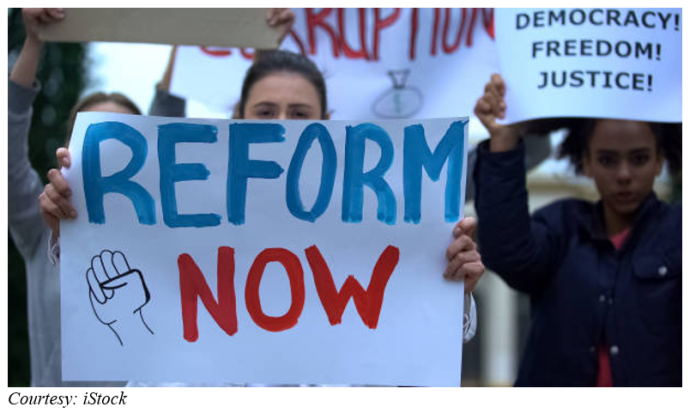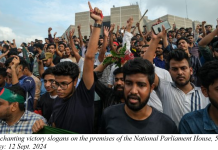Introduction
Throughout history, revolutions have acted as significant catalysts for transformation, and the ‘Monsoon Revolution’ in Bangladesh exemplifies this phenomenon. This upheaval underscored people’s profound discontent with the myopic political leadership and their desire for a revival of substantive democratic practices. The Monsoon Revolution emerged from a confluence of socio-political discontent, fuelled by pervasive corruption and a profound disillusionment rooted in years of political impunity. As citizens mobilized for their rights, the movement flourished into a manifestation of shared determination against a deficient system.
The immediate aftermath of the revolution engendered both aspirations and inquiries. People yearned for a profound change that would deconstruct the entrenched corrupt systems within the framework of sound governance. Nevertheless, the unstable character of this transition necessitated that the subsequent discourse regarding reform be both thorough and insightful.
 The nation, emerging from a battle against authoritarian governance, was originally conceived with a democratic structure aimed at fostering efficiency, fairness, and the well-being of its citizens. Despite sporadic attempts to reform governance frameworks, numerous initiatives were hindered by political opposition, bureaucratic stagnation, and an absence of systemic unity. The weakening of democratic institutions stood as one of the most pressing challenges confronting Bangladesh. Although a semblance of democracy was upheld for a while (1991-2007), whatever core components of democratic governance were tried out, underwent considerable degeneration.
The nation, emerging from a battle against authoritarian governance, was originally conceived with a democratic structure aimed at fostering efficiency, fairness, and the well-being of its citizens. Despite sporadic attempts to reform governance frameworks, numerous initiatives were hindered by political opposition, bureaucratic stagnation, and an absence of systemic unity. The weakening of democratic institutions stood as one of the most pressing challenges confronting Bangladesh. Although a semblance of democracy was upheld for a while (1991-2007), whatever core components of democratic governance were tried out, underwent considerable degeneration.
This essay offers an in-depth look of the proposed governance reforms in Bangladesh within the context of a changing political landscape following the July uprising that dismantled an authoritarian structure. It delves into various dimensions, including relational, institutional, operational, behavioural, ethical, legal, and technological aspects.
Relational reforms: Redefining the political-bureaucratic nexus
The ambiguous relationship between the political and bureaucratic spheres in Bangladesh has, over time, posed a significant obstacle to the advancement of governance reform. The bureaucratic supremacy witnessed in the years before independence (i.e., during the Pakistan era) transformed soon after into a complex and interdependent relationship, marked by high intensity politicization. Subsequent administrations depended on bureaucratic backing to sustain their authority, thereby eroding accountability and promoting nepotism.
In the emerging framework, reforms pertaining to relationships ought to establish distinct demarcations between the political and administrative spheres. The establishment of non-partisan recruitment and promotion systems, the elimination of political patronage, and the fostering of citizen-centric administration are of crucial significance. New policies must underscore the importance of inclusivity and impartiality in governance; however, their successful implementation necessitates a steadfast dedication to depoliticization.
Institutional reforms: Strengthening structures and capacities
Institutional reforms in Bangladesh were significantly shaped by the principles of neoliberalism (i.e., a smaller government devoted to only basic functions and enabling conditions for the private sector to flourish) and the influence of external donor entities. Although public financial management and economic liberalization initiatives exhibit potential, systemic ambiguities and political interference impeded their complete realization. Essential domains for reform should encompass the augmentation of parliamentary efficacy, the fortification of judicial autonomy, and the refinement of local governance frameworks.
Enhancing parliamentary oversight via empowered committees and fostering judicial autonomy through protective measures against political interference are essential. Furthermore, reforms aimed at decentralization ought to enhance the capacity of local government institutions by granting them increased fiscal and administrative autonomy, thereby enabling them to effectively respond to the development needs at the grassroots level.
Operational reforms: Enhancing efficiency and service delivery
Operational inefficiencies stemming from bureaucratic formalism and excessive red tape persistently obstruct effective governance in Bangladesh. Recent initiatives, including e-governance and performance audits, have tried to enhance service delivery; however, their effectiveness has been inconsistent, largely owing to uneven implementation and limitations in capacity.
Proposed reforms ought to emphasize the development of capacity-building initiatives for civil servants, the optimization of budgeting processes, and the establishment of comprehensive monitoring and evaluation frameworks. Furthermore, the incorporation of technology into the field of public service delivery has the potential to significantly improve both transparency and responsiveness. The efficacy of these reforms hinges on the cultivation of inter-agency collaboration and the establishment of robust accountability frameworks.
Behavioural reforms: Transforming administrative culture
The enduring influence of colonial-era administrative culture presents considerable obstacles to the advancement of governance reform. The deeply rooted mentality of bureaucratic superiority, along with an aversion to transformation, hampers initiatives aimed at establishing a government focused on the needs of its citizens. Behavioural reforms should tackle these entrenched attitudes by implementing focused training initiatives that highlight the importance of professionalism, ethical standards, and a commitment to public service.
Transforming the culture within a public organization necessitates a steadfast commitment from leadership and the implementation of incentives that promote constructive behaviour. Implementing performance-based evaluations and encouraging collaboration among different cadres within the civil service are crucial for cultivating a unified and driven workforce.
Ethical reforms: Combating corruption and promoting integrity
 Corruption continues to be a common problem in Bangladesh, eroding public confidence and its effectiveness of governance. Notwithstanding the presence of the Anti-Corruption Commission and supplementary initiatives, enforcement was feeble owing to political involvement and insufficient institutional backing. It is imperative for ethical reforms to focus on enhancing anti-corruption measures, establishing robust whistle-blower protection systems, and cultivating a culture of transparency via comprehensive public awareness initiatives. Embracing a compliance-oriented framework in conjunction with integrity-focused training for public officials has the potential to foster a governance landscape characterized by heightened accountability.
Corruption continues to be a common problem in Bangladesh, eroding public confidence and its effectiveness of governance. Notwithstanding the presence of the Anti-Corruption Commission and supplementary initiatives, enforcement was feeble owing to political involvement and insufficient institutional backing. It is imperative for ethical reforms to focus on enhancing anti-corruption measures, establishing robust whistle-blower protection systems, and cultivating a culture of transparency via comprehensive public awareness initiatives. Embracing a compliance-oriented framework in conjunction with integrity-focused training for public officials has the potential to foster a governance landscape characterized by heightened accountability.
Legal reforms: Upholding the rule of law
The autonomy and strength of the judiciary are paramount to the advancement of governance reform. Nonetheless, in the past, excessive political interference and procedural hindrances diminished public trust in the legal framework. Legal reforms ought to prioritize the protection of judicial independence, the acceleration of case resolution processes, and the guarantee of equitable access to justice for every citizen.
The establishment of an ombudsman institution, as outlined in the 1972 Constitution, has the potential to offer a neutral forum for the resolution of citizen complaints regarding governmental conduct. Furthermore, re-examining antiquated legal structures and harmonizing them with modern governance requirements has the potential to fortify the rule of law.
Technological reforms: Leveraging digital innovation
Despite failures in several areas, Bangladesh has achieved notable advancements in technological integration, especially concerning e-governance and the provision of digital services. Initiatives such as Union Digital Centres and online public services have significantly improved some citizen-centric services. Nonetheless, the improper application of digital instruments, exemplified by the now-defunct contentious Digital Security Act, prompted significant apprehensions regarding the preservation of freedom of expression and the accountability of governmental entities.
Proposed technological reforms ought to prioritize the enhancement of digital infrastructure, guarantee equitable access to technology, and cultivate innovation within the context of public service delivery. Simultaneously, the protection of digital rights via legislative scrutiny is crucial to avert the misuse of authority.
Conclusion
 Reforming governance in Bangladesh necessitates a comprehensive and cohesive strategy that tackles the interconnected issues of institutional deficiencies, behavioural resistance, and pervasive corruption. The suggested guiding principles for reforms delineated above offer a framework for establishing a governance system that is more inclusive, accountable, and efficient. Nonetheless, their achievement is contingent upon the political commitment to embrace transformation, the ability of institutions to execute reforms, and the proactive involvement of civil society and global participants.
Reforming governance in Bangladesh necessitates a comprehensive and cohesive strategy that tackles the interconnected issues of institutional deficiencies, behavioural resistance, and pervasive corruption. The suggested guiding principles for reforms delineated above offer a framework for establishing a governance system that is more inclusive, accountable, and efficient. Nonetheless, their achievement is contingent upon the political commitment to embrace transformation, the ability of institutions to execute reforms, and the proactive involvement of civil society and global participants.
Through the assimilation of exemplary practices from around the world and their adaptation to its distinctive circumstances, Bangladesh has the potential to address its governance challenges and attain sustainable development. The moment is ripe for a unified initiative to transcend mere incremental adjustments and engage in profound reforms that resonate with the ambitions of the populace and the exigencies of an evolving global landscape.

Habib Zafarullah
Dr. Habib Zafarullah has taught at the Universities of Dhaka, New England and Sydney. He has published extensively in democratic governance, public policy, and international development. His recent books include Governance and Sustainable Development in South Asia; Open Government and Freedom of Information; Handbook of Development Policy; and Colonial Bureaucracies. He has also published numerous articles and book chapters. E-mail: habibzed@gmail.com




